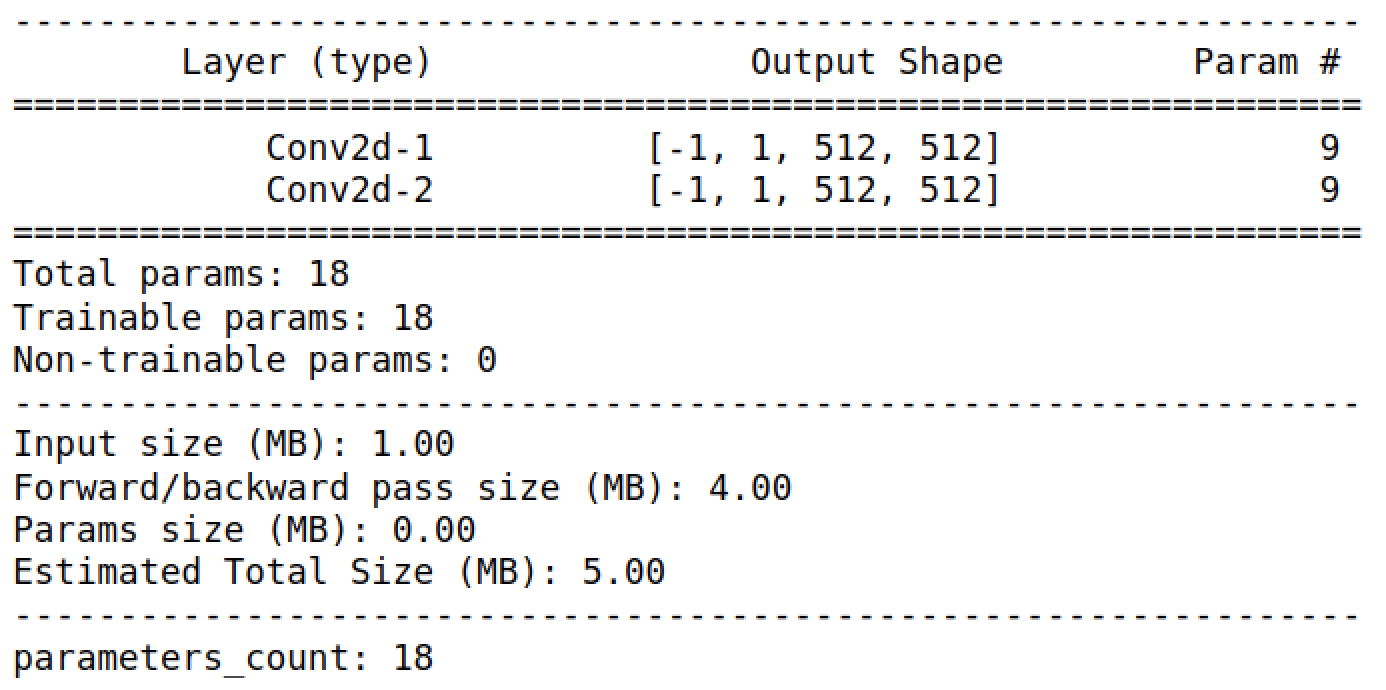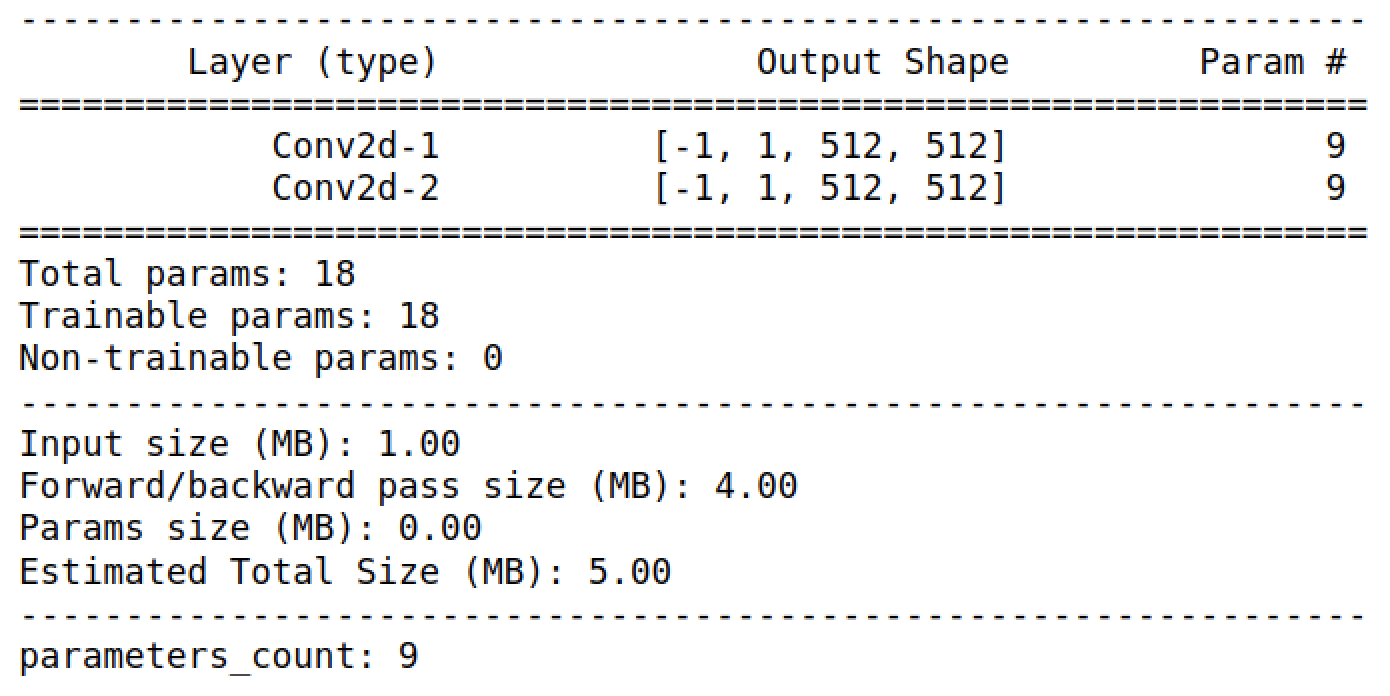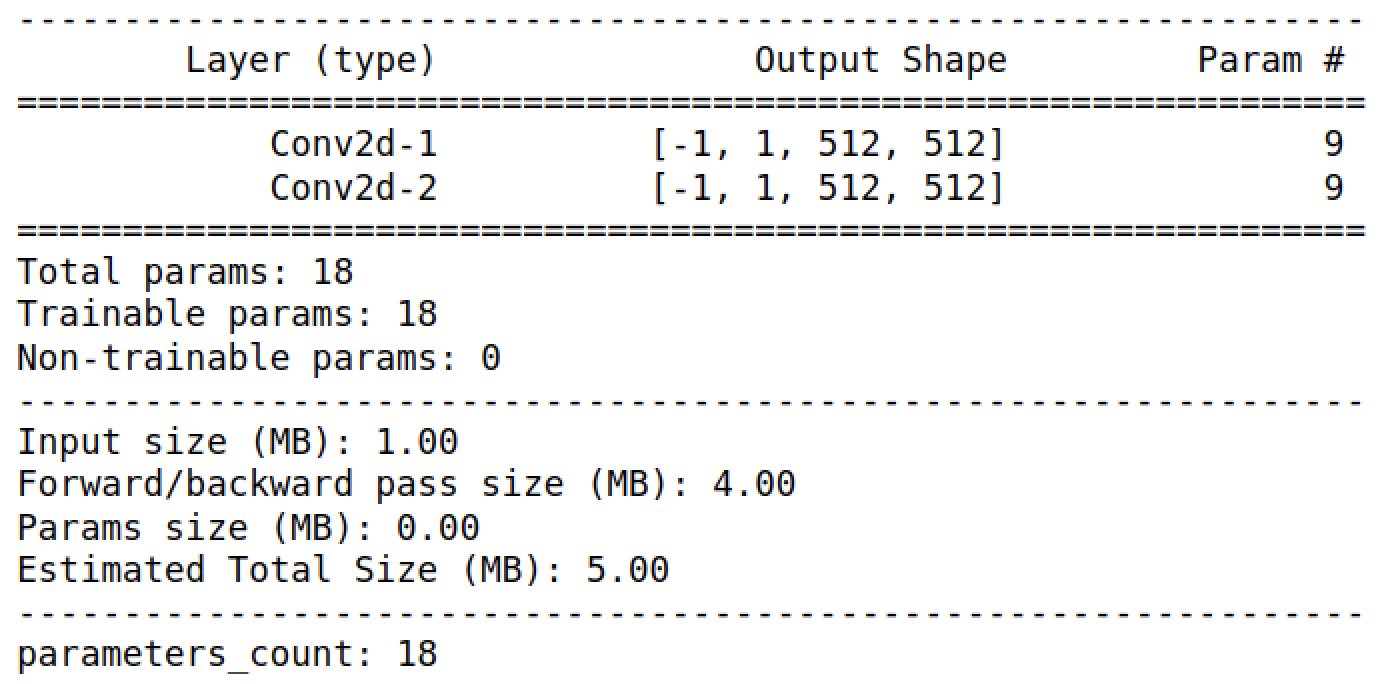
PyTorch 统计网络参数量
神经网络的参数统计是很重要的,它反映了一个网络的硬件需求与性能。PyTorch 可以使用第三方库 torchsummary 来统计参数并打印层结构。但是想要正确统计出参数量,需要对如何统计参数有一定的了解。
Case1 无参数共享(最常见)
1
2
3
4
5
6
7
8
9
10
11
12
13
14
15
16
17
18
19
20
21
22
23
24
25
26
27
28
29
30
31
32
33
34
35
36
37
import torch
import torch.nn as nn
import torchsummary
from torch.nn import init
class BaseNet(nn.Module):
def __init__(self):
super(BaseNet,self).__init__()
self.conv1=nn.Conv2d(in_channels=1,out_channels=1,kernel_size=3,stride=1,padding=1,bias=False)
self.conv2=nn.Conv2d(in_channels=1,out_channels=1,kernel_size=3,stride=1,padding=1,bias=False)
for m in self.modules():
if isinstance(m, nn.Conv2d):
nn.init.kaiming_uniform_(m.weight.data)
if m.bias is not None:
m.bias.data.zero_()
elif isinstance(m, nn.BatchNorm2d):
init.normal_(m.weight.data, 1.0, 0.02)
init.constant_(m.bias.data, 0.0)
def forward(self,x):
x=self.conv1(x)
out_map=self.conv2(x)
return out_map
def count_parameters(model):
'''
model.parameters() 取得模型的参数,在参数可求导 p.requires_grad 的情况下,使用 numel()统计 numpy 数组里面的元素的个数。
'''
return sum(p.numel() for p in model.parameters() if p.requires_grad)
model = BaseNet()
torchsummary.summary(model, (1, 512, 512))
print('parameters_count:',count_parameters(model))
结果:

在这个案例中,使用 torchsummary 和自己统计得到相同的结果。
Case2 参数共享
1
2
3
4
5
6
7
8
9
10
11
12
13
14
15
16
17
18
19
20
21
22
23
24
25
26
27
28
29
30
31
32
33
import torch
import torch.nn as nn
import torchsummary
from torch.nn import init
class BaseNet(nn.Module):
def __init__(self):
super(BaseNet,self).__init__()
self.conv1=nn.Conv2d(in_channels=1,out_channels=1,kernel_size=3,stride=1,padding=1,bias=False)
for m in self.modules():
if isinstance(m, nn.Conv2d):
nn.init.kaiming_uniform_(m.weight.data)
if m.bias is not None:
m.bias.data.zero_()
elif isinstance(m, nn.BatchNorm2d):
init.normal_(m.weight.data, 1.0, 0.02)
init.constant_(m.bias.data, 0.0)
def forward(self,x):
x=self.conv1(x)
out_map=self.conv1(x)
return out_map
def count_parameters(model):
return sum(p.numel() for p in model.parameters() if p.requires_grad)
model = BaseNet()
torchsummary.summary(model, (1, 512, 512))
print('parameters_count:',count_parameters(model))
结果:

在这里例子中, parameter_count 统计的是 9 个参数,而 torchsummary 统计的是 18 个参数,为什么会出现这种问题?在这个网络中,我们只初始化了一个卷积层对象 conv1 ,然后在网络构建时( forward 函数中),重复调用了conv1 ,以实现参数共享,即 Conv2d-1 和 Conv2d-2 层共享了 conv1 的参数。因此本例中 parameter_count 的计算是对的,而 torchsummary 计算时是先把层结构打印下来,然后统计各个层的参数并求和,不区分 Conv2d-1 和 Conv2d-2 层的参数是否相同。
结论:在遇到参数共享的时候, torchsummary 统计的是不正确的!
Case3 初始化无用变量
1
2
3
4
5
6
7
8
9
10
11
12
13
14
15
16
17
18
19
20
21
22
23
24
25
26
27
28
29
30
31
32
33
34
import torch
import torch.nn as nn
import torchsummary
from torch.nn import init
class BaseNet(nn.Module):
def __init__(self):
super(BaseNet,self).__init__()
self.conv1=nn.Conv2d(in_channels=1,out_channels=1,kernel_size=3,stride=1,padding=1,bias=False)
self.conv2=nn.Conv2d(in_channels=1,out_channels=1,kernel_size=3,stride=1,padding=1,bias=False)
for m in self.modules():
if isinstance(m, nn.Conv2d):
nn.init.kaiming_uniform_(m.weight.data)
if m.bias is not None:
m.bias.data.zero_()
elif isinstance(m, nn.BatchNorm2d):
init.normal_(m.weight.data, 1.0, 0.02)
init.constant_(m.bias.data, 0.0)
def forward(self,x):
x=self.conv1(x)
out_map=self.conv1(x)
return out_map
def count_parameters(model):
return sum(p.numel() for p in model.parameters() if p.requires_grad)
model = BaseNet()
torchsummary.summary(model, (1, 512, 512))
print('parameters_count:',count_parameters(model))
结果:

这个例子中我们在初始化时多初始化了一个 conv2 卷积层对象,但是没有在 forward 中使用。此时 parameter_count 出现了错误,即使没有在 forward 中调用,但是也会被算在 model.parameters() 中。但是要注意,尽管 torchsummary 和 parameter_count 都出现了同样结果的错误,两者出现错误的原因是不同的。
如果觉得本教程不错或对您有用,请前往项目地址 https://github.com/Harry-hhj/Harry-hhj.github.io 点击 Star :) ,这将是对我的肯定和鼓励,谢谢!
参考文献
可以下载本文的例子自行实践:链接: https://pan.baidu.com/s/1eet8b_HVmc_WMdIGxCibqA 提取码: p1j3
作者:Harry-hhj,github主页:传送门